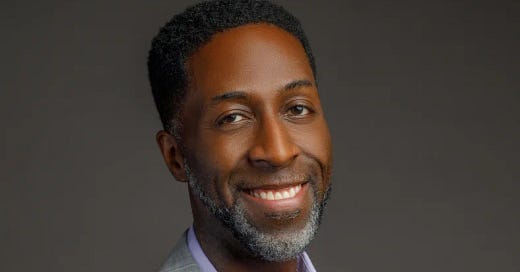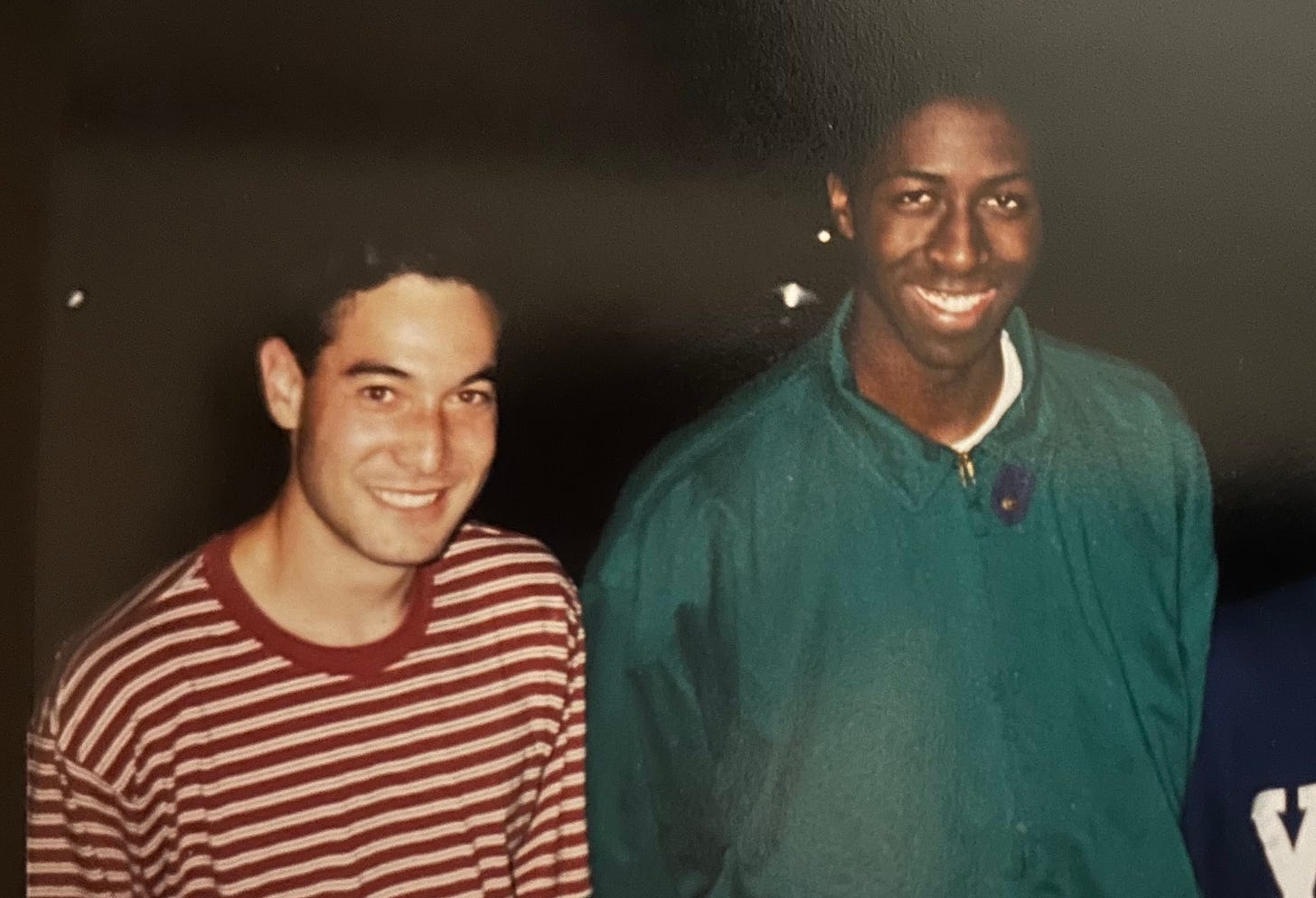Christian. Black. Neuroscientist.
My Q&A with Yale Professor Nii Addy on navigating complex roles and identities
This week’s edition of Some Assembly Required is a Q&A with Dr. Nii Addy, someone who has thought a lot about navigating the complexities of difference in his life and work.
I thought my job title was long, but Nii’s is exceptional: he is the Albert E. Kent Associate Professor of Psychiatry and Associate Professor of Cellular and Molecular Physiology at Yale School of Medicine. Nii directs a federally funded research program investigating cholinergic, dopaminergic and L-type calcium channel mechanisms mediating substance use and mood disorders. His team also studies the ability of tobacco product flavor additives to alter nicotine use behavior and addiction.
Nii is also the inaugural Director of Scientist Diversity, and Inclusion at the School of Medicine. And he has a podcast, The Addy Hour, and a Substack, The Addy Minute.
Nii and I met as undergraduates at Duke, and we’ve remained over many years. More recently, he has served alongside me on the Board of Trustees for The Carver Project. This post came together during Nii’s recent visit to St. Louis.
John Inazu: It’s been a minute since I read up on cholinergic, dopaminergic and L-type calcium channel mechanisms. Can you tell us a bit about your academic work and research?
Nii Addy: It sounds like I should be asking what you remember about these mechanisms. But I’ll leave that for another time. For a big picture perspective, we’re trying to understand the brain processes that underlie addiction, anxiety and depression.
We study nicotine use, cocaine use, drug craving and relapse, anxiety-related behaviors, loss of motivation, and behaviors associated with depression. We study these behaviors in rodent models, where we can investigate how brain chemical messengers (neurotransmitters like acetylcholine and dopamine) and calcium processes lead to these behaviors. We then leverage the scientific understanding gained from these studies and collaborate with psychiatrists and psychologists to design clinical studies.
Our goals are three-fold. First, we want to understand the brain processes that cause or allow these behavioral changes to occur. Second, we seek to gain insight into the biological causes of mental illnesses. Third, we want to identify novel targets for medication-based therapeutics that can be effectively combined with behavioral interventions.
JI: You are a Black Christian in elite academic medicine, which I imagine is a somewhat rare overlap. What has been your experience navigating your different identities? What relationships have you found the most encouraging and discouraging in this regard?
In my experience, it has definitely been a rare overlap of being a Christian and a Black academic. This is especially true in scientific circles. At the same, I’ve been blessed to interact with more and more people in similar situations. This includes other professors, staff, students and trainees.
The discouraging experiences are sometimes borne out of people’s good intentions. In the past, some colleagues tried to use a color-blind mindset. I’d hear comments like, “I don’t see you as Black, I just see you as another scientist.” It may sound good and inclusive. But that response is completely inconsistent with how I experience life in academia as a Black Scientist. When I walk into a lab, participate in a meeting, lecture in a classroom, or speak at a conference as one of the few Black people in the room, people are not simply perceiving me and interacting with me as “just another scientist.” People’s reactions range from curiosity about my perspective as a Black scientist, to wanting me to speak on behalf of all Black people, to outright discrimination, dismissiveness, or racism.
It’s been important to unpack these realities and acknowledge all the challenges that accompany this experience. It’s also important to think about the ways we can all support each other, without pretending that realities don’t exist. Thankfully, many people have been engaging in these conversations with more of an empathetic and listening ear. I’ve also been blessed to engage with like-minded individuals, mentors and sponsors in so many different organizations. This includes my participation as a graduate student in the Summer Program in Neuroscience, Ethics and Success (SPINES), my involvement at Yale in the Minority Organization for Retention and Expansion (MORE), my participation with the Veritas Forum, and of course my ongoing engagement with The Carver Project!
JI: Somewhat related to the last question, what is one way that you’ve felt most misunderstood in your professional and public roles? How do you navigate this?
NA: Early in my training and career, I felt misunderstood when people stated that being a scientist and a Christian were incompatible. There were times when people viewed my faith as somehow negatively impacting my legitimacy as a scientist. As a Black scientist, I’ve also met me people who have incredulously said, “You’re Dr. Addy?” as if to say, “You can’t possibly be Dr. Addy.”
Earlier in my career, these experiences were very frustrating. They caused me to doubt my place as a scientist. With time, I’ve had many validating experiences that have reminded me of my value and my valuable contributions. That’s not to say that the negative reactions aren’t still frustrating. But I’ve shifted my mindset to focus on what God has called me to do. I’ve tried to pay less attention to the naysayers and those passing judgment based on very limited knowledge about me.
JI: Can you say a bit about your new role directing scientist diversity and inclusion at Yale’s School of Medicine?
NA: This is a role in the Dean’s office, where I’m supporting our research faculty (PhD researchers and MD/PhD physician-scientists) from underrepresented backgrounds. In collaboration with a few different offices and affinity groups, we’re trying to ensure that Yale is a place where our underrepresented faculty feel enabled to fully contribute and thrive. We’re facilitating an atmosphere of belonging and inclusivity, providing mentorship, professional development and networking opportunities, and giving leadership training and leadership opportunities.
JI: You spoke last week in St. Louis about mental wellness and the church. What do you see as the biggest challenges and the biggest opportunities for churches in the area of mental wellness?
NA: Mental wellness is critically important for all of us, but mental health challenges and mental illnesses typically feel disruptive. When we face something disruptive or uncertain, we often approach the challenge by using whatever is most familiar to us. It’s so easy to default to a one approach fits all mentality—whatever our one approach is. Our one approach may revolve around spiritual practices, it may involve talking to a counselor or social worker, or it may include psychological and psychiatric approaches.
The one size fits all approach happens both inside and outside of the church. But within the church, we sometimes have the added layer of being dismissive of “non-spiritual” approaches. Or we may be wary of approaches that don’t inherently incorporate a spiritual or faith component. This can limit us from taking advantage of the full range of available tools for maintaining mental wellness and to address mental health challenges.
Therein lies the opportunity to integrate and avail ourselves to various tools for mental wellness. I’m grateful to see many more partnerships and innovative collaborations being established between churches, mental health organizations, and mental health providers. A beautiful example of this is Crossroads Counseling Centers in St. Louis, which partners with churches and organizations throughout the region. I also see examples of this in other parts of the country, where churches and pastors are partnering with mental health professionals to provide mental health services within church environments. But of course, we need to continue to build collaborations that can support faith leaders and bring care and access to a broader group of people and communities.
JI: You host a podcast called The Addy Hour, and discuss topics at the intersection of neuroscience, mental health, faith, culture, and social justice. What have been some of your favorite episodes, and why?
NA: This is always the most difficult question to answer. This is partially because each episode has been deeply gratifying in its own way. It’s also partially because I hear so many unique perspectives and on every podcast episode.
One of my favorite pairings was my hosting of NFL player (now NFL veteran) Doug Middleton and psychologist Dr. Alfiee Breland-Noble. They are both incredible mental health advocates, and they both talked about ways they’re trying to decrease stigma and normalize mental health conversations. It was amazing to hear many parallels in their stories and experiences. I also had a powerful, refreshing and informative conversation with former Duke women’s basketball coach, Joanne “Coach P” McCallie. In that episode, she recounted her decades long experience with bipolar disorder, throughout her coaching career. She also touched on topics like empathy and empowerment, decreasing stigma, and integrating faith and our spiritual practices in addressing mental wellness.
JI: This newsletter is about protests, pluralism, and people, and I know you have experience with all three. How do you think about the role of protest in our pluralistic society? When have you seen it done well?
NA: I believe that protests are done well when there is a spirit of seeking to have empathy and gain understanding of the “other side.” I realize this sounds counterintuitive, especially in times where righteous indignation and an outcry against injustice are the underlying reasons for protest. But as you’ve highlighted several times in Some Assembly Required, this spirit of generativity can be transformative. Sometimes, it takes both sides truly listening to each other with the goal of understanding each other and moving forward in meaningful and practical ways.
I recently spoke at a conference for legal professionals, where they highlighted how unfortunate circumstances sometimes create opportunities for effective protests. In particular, after the murder of George Floyd, there were so many different groups of people that came together, despite their many differences, to stand against a common injustice. As the legal professionals recounted, some of the legal changes that resulted from that unfortunate situation would have been nearly impossible to enact even 5 or 10 years ago.
More recently, I have also seen pluralism done well and more appropriately in academic settings. Many people are finally acknowledging how disrespectful and non-inclusive it is to diminish people based on their deeply held faith traditions and religious convictions. On college campuses, I’ve seen a greater acknowledgement of various faith perspectives. I’ve also seen a greater willingness for people to learn from one other’s faith, rather than to diminish, ridicule or demean those whose faith perspectives differ from your own. By example, I see this being done well by Interfaith America!
JI: What is the best collegiate basketball team in the history of sports?
NA: Clearly the Duke Blue Devils!
JI: Correct.
You can hear more from Nii on The Addy Hour:








Hi John! Great interview. For future conversations along these lines, you might consider connecting with another Christian Black neuroscientist, Bianca Jones-Marlin at Columbia University. https://www.biancajonesmarlin.com